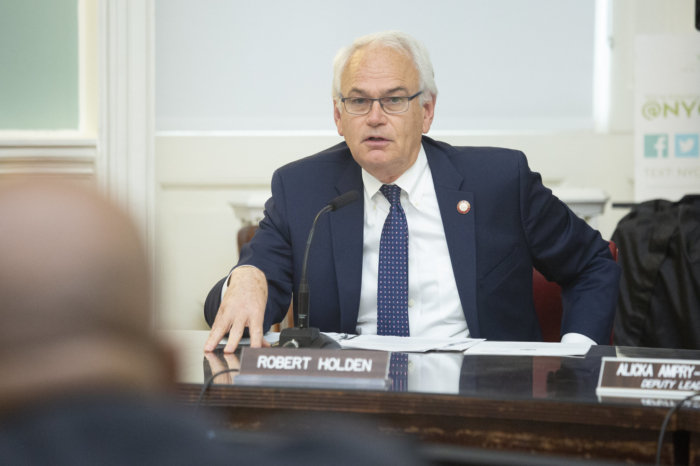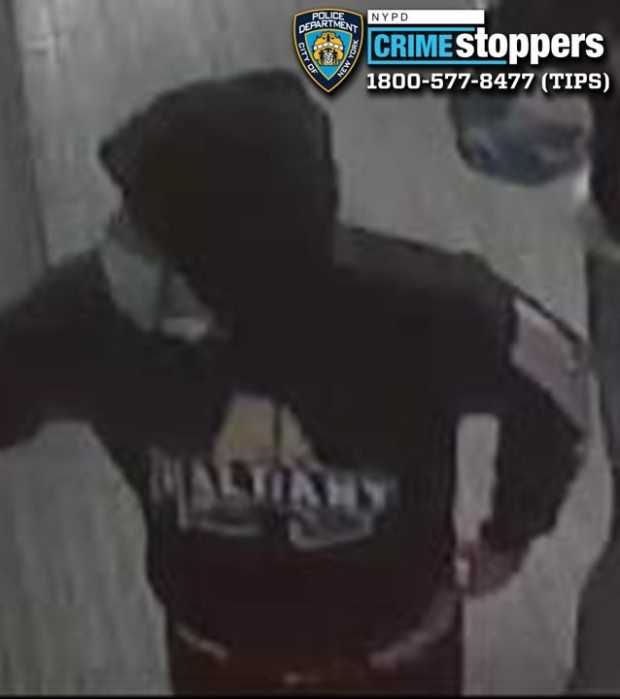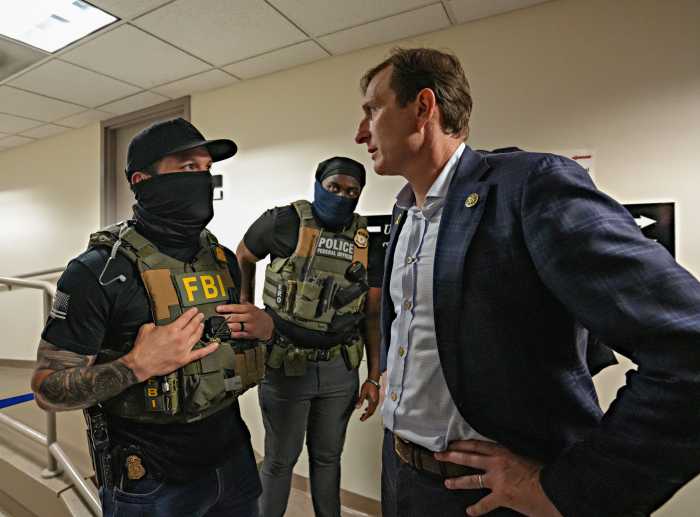By Bryan Schwartzman
More than 4,000 people packed the Queens National Guard Armory in Jamaica Friday and Saturday for the Cowboy Heritage Rodeo 2000, an event sanctioned by the International Professional Rodeo Association.
Cowboys and cowgirls from 22 states as well as Canada, Mexico, and France competed for a total of $25,000 in prize money as well as a chance to earn points for the IPRA tour.
The enormous building on 168th Street was transformed as dirt was laid across the floor, metal fences were put up, and bleachers were erected.
“It's been fun, but it's been a lot of work,” said Fred Brothers, a Laurelton resident and organizer of the rodeo. “It's nice to bring pro-rodeo back to the inner city.”
Brothers is an officer with the Cowboy Heritage Foundation, the Queens-based group which sponsored the event. Brothers said the rodeo was difficult to organize because he had to raise $80,000 to hold the event, not to mention figuring out how to get more than 200 participants, along with horses, calves, steers and bulls to downtown Jamaica.
“This cost a lot of money,” said Brothers, who said he is the first black cowboy to organize a major rodeo in an inner city setting.
Brothers, 45, was born in South Carolina and has competed in rodeo events. He said about a third of cowboys in the American West were black. He also said white ranchers were known as cattlemen while blacks who drove cattle herds became known as “cowboys.”
“I've never heard of that,” said Fred Young, a local historian and author who lives in Dodge City, Kan., “The Queen of the Cowtowns,” where the cattle drives from Texas ended in the 1870s.
Young said in a telephone interview he believed “cowboy” was originally a Spanish phrase and that it initially referred to Mexican cowherders.
“But it's possible a piece of African-American history is not being told,” said Young, who has written a book about the history of Dodge City in the late 1800s. He added that many cowboys were black, although historians have not been able to pinpoint an exact percentage.
“Nobody knows when or how rodeos actually started,” Young said.
But any racial elements to the event were not noticeable as residents from all over Queens, the other four boroughs and Long Island mingled in the crowd.
“I see this as a positive atmosphere,” said Jamaica resident Dwayne Johnson. “Everybody is friendly, there is no cursing, and there is no racial discrimination.”
“This is about a love of the history of this country,” said Maree Rodgers, a Connecticut resident who is also a member of the Cowboy Heritage Foundation.
Rodgers said the rodeo put on several non-competitive performances for local schools last Wednesday and last Thursday.
Early Saturday morning, about 200 cowboys and cowgirls were treated to a special breakfast at the Jamaica YMCA.
Rodeo competitions are divided into riding events and timed events, according to the IPRA. Riding or “rough stock” events include bareback bronco riding, saddled bronco riding, and bull riding. Judges award riders from 1 to 25 points, based on how well they ride the bucking horse or bull.
Timed events include steer wrestling, team roping, barrel racing and calf roping.
Many in the audience were children and their faces showed their amazement when a bucking bull was released from his cage and a cowboy struggled to hang on, but would eventually be thrown off and would have to make sure to steer clear of the frenzied animal.
“I've never seen anything like this in Jamaica,” said Dawn Kelly, a former York College spokeswoman.
“This gives the kids the opportunity to experience a different world,” said Priscilla Clayton of Jamaica. Clayton brought her child and her neighbors to the event.
Children had the opportunity to ride a slow-moving mechanical bull. Dozens of kids and teens looked on and cheered their friends as they got of glimpse of what it was like to be a bull rider.
While the audience seemed to enjoy the show, some said they did not appreciate the calf-roping event in which a competitor riding a horse chases after a calf, ropes its feet together and wrestles it to the ground.
“When they rope the cattle, it looks demeaning,” said Brenda Fallen of College Point. Fallen brought her daughter to the event.
“All day everyone cheered, but no one cheered when they wrestled the cattle down to the ground,” she said.
While the rodeo was taking place Saturday afternoon, about 100 people from the In Defense of Animals organization protested outside, calling for the rodeo to be banned because they contend the sport creates a spectacle out of cruelty to animals.
But Fallen said that overall the rodeo was a good experience for her kids.
“This was a big success,” said Brothers. “I did lose some money, but we were able to bring pro rodeo to New York.”





































